- Home
- Louisa May Alcott
The Annotated Little Women Page 27
The Annotated Little Women Read online
Page 27
Frank, sitting just behind the little girls, heard what they were saying, and pushed his crutch away from him with an impatient gesture, as he watched the active lads going through all sorts of comical gymnastics. Beth, who was collecting the scattered Author-cards, looked up, and said, in her shy yet friendly way,—
“I’m afraid you are tired; can I do anything for you?”
“Talk to me, please; it’s dull, sitting by myself,” answered Frank, who had evidently been used to being made much of at home.
If he had asked her to deliver a Latin oration, it would not have seemed a more impossible task to bashful Beth; but there was no place to run to, no Jo to hide behind now, and the poor boy looked so wistfully at her, that she bravely resolved to try.
“What do you like to talk about?” she asked, fumbling over the cards, and dropping half as she tried to tie them up.
“Well, I like to hear about cricket, and boating, and hunting,” said Frank, who had not yet learned to suit his amusements to his strength.
“My heart! whatever shall I do! I don’t know anything about them,” thought Beth; and, forgetting the boy’s misfortune in her flurry, she said, hoping to make him talk, “I never saw any hunting, but I suppose you know all about it.”
“I did once; but I’ll never hunt again, for I got hurt leaping a confounded five-barred gate; so there’s no more horses and hounds for me,” said Frank, with a sigh that made Beth hate herself for her innocent blunder.
“Your deer are much prettier than our ugly buffaloes,” she said, turning to the prairies for help, and feeling glad that she had read one of the boys’ books in which Jo delighted.
Buffaloes proved soothing and satisfactory; and, in her eagerness to amuse another, Beth forgot herself, and was quite unconscious of her sister’s surprise and delight at the unusual spectacle of Beth talking away to one of the dreadful boys, against whom she had begged protection.
“Bless her heart! She pities him, so she is good to him,” said Jo, beaming at her from the croquet-ground.
“I always said she was a little saint,” added Meg, as if there could be no further doubt of it.
“I haven’t heard Frank laugh so much for ever so long,” said Grace to Amy, as they sat discussing dolls, and making tea-sets out of the acorn-cups.
“My sister Beth is a very fastidious girl, when she likes to be,” said Amy, well pleased at Beth’s success. She meant “fascinating,” but, as Grace didn’t know the exact meaning of either word, “fastidious” sounded well, and made a good impression.
An impromptu circus, fox and geese, and an amicable game of croquet, finished the afternoon. At sunset the tent was struck, hampers packed, wickets pulled up, boats loaded, and the whole party floated down the river, singing at the tops of their voices. Ned, getting sentimental, warbled a serenade with the pensive refrain,—
“Alone, alone, ah! woe, alone,”
and at the lines—
“We each are young, we each have a heart,
Oh, why should we stand thus coldly apart?”
he looked at Meg with such a lackadaisical expression, that she laughed outright, and spoilt his song.17
“How can you be so cruel to me?” he whispered, under cover of a lively chorus; “you’ve kept close to that starched-up English woman all day, and now you snub me.”
“I didn’t mean to; but you looked so funny I really couldn’t help it,” replied Meg, passing over the first part of his reproach; for it was quite true that she had shunned him, remembering the Moffat party and the talk after it.
Ned was offended, and turned to Sallie for consolation, saying to her, rather pettishly, “There isn’t a bit of flirt in that girl, is there?”
“Not a particle; but she’s a dear,” returned Sallie, defending her friend even while confessing her short-comings.
“She’s not a stricken deer, any-way,” said Ned, trying to be witty, and succeeding as well as very young gentlemen usually do.
On the lawn where it had gathered, the little party separated with cordial good-nights and good-byes, for the Vaughns were going to Canada. As the four sisters went home through the garden, Miss Kate looked after them, saying, without the patronizing tone in her voice, “In spite of their demonstrative manners, American girls are very nice when one knows them.”
“I quite agree with you,” said Mr. Brooke.18
1. penny post. Instituted in 1840 as part of a comprehensive reform of the United Kingdom’s Royal Mail, the Penny Post guaranteed delivery of letters weighing a half ounce or less for a penny. In America in 1862, when this chapter is set, as well as in 1868, when Little Women was written, first-class postage cost three cents.
2. “play propriety.” To act as a chaperone.
3. putting a clothes-pin on her nose. Maude Appleton McDowell avers that May Alcott actually did apply a clothespin to her nose in hopes of improving its shape (Shealy, ed., Alcott in Her Own Time, p. 221).
4. “You shall not make a guy of yourself” . . . old-fashioned Leghorn.” Meg’s use of “guy” here does not refer to Jo’s tomboyishness. A “guy” as she means it is a person of grotesque appearance, especially as to dress (Oxford English Dictionary). Meg’s use of the word is chiefly British; she may be using it in anticipation of her day with the English visitors. Jo’s reply in the next paragraph, “I don’t mind being a guy, if I’m comfortable,” is more ambiguous. The meaning of “guy” as man or fellow was principally American. Jo may be bringing the conversation back to American usage, both to bring Meg back to earth a bit and to assert her own enjoyment of acting like a boy. A leghorn is a hat of plaited straw, made from a particular kind of wheat, and so named because it was imported from the Tuscan city of Leghorn, or Livorno.
5. wherry. A light rowboat.
6. Mr. Brooke. In her journal for 1858, the year John Pratt, the real-life Mr. Brooke, became engaged to Anna Alcott, Louisa pronounced him “full of fine possibilities, but so modest one does not see it at once. He is handsome, healthy, and happy, just home from the West, and so full of love he is pleasant to look at” (Louisa May Alcott, Journals, p. 89).
7. croquet. The presence of croquet in both Little Women and Lewis Carroll’s Alice’s Adventures in Wonderland attests to the game’s tremendous popularity in both England and the United States in the 1860s. May Alcott seized upon the fad with singular zeal. She acquired a set of mallets, balls, and wickets in 1863 and, in June of that year, boasted of playing a twelve-hour marathon “from 9 AM to 9 P.M. Not a very useful day but I am considered a fine player which is very gratifying” (bMS Am 1817 [56], Houghton Library, Harvard University).
8. “We don’t cheat in America; but you can, if you choose.” The episode of cheating by the English boy, Fred, is another instance of Alcott’s defining Americanness by contrasting it with a different national character. Alcott’s first extended contact with an Englishman, the arrogant and impractical reformer Charles Lane, who cofounded the disastrous Fruitlands with her father, was far from pleasant. Still fresher in Alcott’s mind was Britain’s refusal to support the Union more strongly in the American Civil War, and she had been shocked on her trip to Europe in 1865–66 to observe the continuing strength of pro-southern sentiment on the part of the English people she met. Alcott thus tended to regard the British as both elitist and duplicitous, and she here contrasts their perfidies with American honesty and magnanimity.
9. “ ‘Authors.’ ” The original Authors card game was published by G. M. Whipple and A. A. Smith in Salem, Massachusetts, in 1861. It was still enjoying its first burst of popularity the following year, when this chapter is set. May Alcott mentions playing the game in her journal for May 1863 (bMS Am 1817 [56], Houghton Library, Harvard University).
10. “Do you know ‘Truth?’ ” May Alcott enjoyed a similar game called “Candor” so greatly that she and her friends, in August 1863, formed a “Candor Club to meet regularly every evening in boats if possible so as to prevent any one hearing our confidential conversati
ons” (bMS Am 1817 [57], Houghton Library, Harvard University). In an early scene of Mark Adamo’s Little Women opera, the March sisters play a game of “Truth or Fabrication” that reveals important points of their characters. In contrast to her real-life counterpart, the operatic Amy declares, “I loathe this game, and I always have.”
11. “What is your greatest fault?” Alcott’s father asked her this same question on her eleventh birthday. Her response was the same as Jo’s.
12. “Didn’t you take your story out of ‘The Sea Lion?’ ” Laurie is typically thought to be referring to Sylvanus Cobb’s The Sea Lion, or, The Privateer of the Penobscot (1853). Alcott may also have been thinking of James Fenimore Cooper’s novel The Sea Lions, or, The Lost Sealers (1849).
13. “a true John Bull” John Bull personifies England much as Uncle Sam represents America. Washington Irving, the American writer who created Rip Van Winkle and Ichabod Crane, gave this description of John Bull: “[A] plain downright matter-of-fact fellow, with much less of poetry about him than rich prose. There is little of romance in his nature, but a vast deal of a strong natural feeling. He excels in humour more than in wit; is jolly rather than gay; melancholy rather than morose; can easily be moved to a sudden tear, or surprised into a broad laugh; but he loathes sentiment, and has no turn for light pleasantry. He is a boon companion, if you allow him to have his humour, and to talk about himself; and he will stand by a friend in a quarrel, with life and purse, however soundly he may be cudgelled.” (Washington Irving, Sketch Book of Geoffrey Crayon, pp. 276–77).
John Bull admonishes an upstart Yankee Doodle in an 1861 issue of Punch. (Punch magazine, December 7, 1861)
14. “Schiller’s ‘Mary Stuart.’ ” Johann Christoph Friedrich von Schiller (1759–1805) holds a reputation among German romantic authors second only to Goethe’s. His 1800 play Maria Stuart gives a sympathetic treatment to Mary, Queen of Scots, the doomed, imprisoned rival of Elizabeth I of England. In her journal for 1852, Alcott listed Schiller’s plays as one of her favorite books.
15. ashamed to lament her hard lot. Alcott was less certain of the dignity of American labor a few years later when she published her adult novel Work: A Story of Experience. In that novel, the heroine, Christie Devon, is driven to the brink of suicide by the cruelty of the marketplace. Alcott writes, “There are many Christies, willing to work, yet unable to bear the contact with coarser natures which makes labor seem degrading, or to endure the hard struggle for the bare necessities of life when life has lost all that makes it beautiful” Louisa May Alcott, Work, 148–49.
16. “the Row.” Grace refers to Rotten Row, the unattractively named but eminently stylish track on the southern side of Hyde Park, London, where fashionable Victorians came to ride, see, and be seen.
17. spoilt his song. Ned’s song is inspired by James Russell Lowell’s 1840 poem “Serenade,” quoted here in its entirety:
From the close-shut windows gleams no spark,
The night is chilly, the night is dark,
The poplars shiver, the pine-trees moan,
My hair by the autumn breeze is blown,
Under thy window I sing alone,
Alone, alone, ah woe! alone!
The darkness is pressing coldly around,
The windows shake with a lonely sound,
The stars are hid and the night is drear,
The heart of silence throbs in thine ear,
In thy chamber thou sittest alone,
Alone, alone, ah woe! alone!
The world is happy, the world is wide,
Kind hearts are beating on every side;
Ah, why should we lie so coldly curled
Alone in the shell of this great world?
Why should we any more be alone?
Alone, alone, ah woe! alone!
O, ’tis a bitter and dreary word
The saddest by man’s ear ever heard!
We each are young, we each have a heart,
Why stand we ever coldly apart?
Must we forever, then, be alone?
Alone, alone, ah woe! alone!
Lowell’s poem later supplied the lyrics for a popular song called “Alone! Alone! Serenade,” with music by George Boweryem. However, since that song did not appear until 1864, either Ned’s tune is a different musical setting or Alcott mistook her chronology.
18. “I quite agree with you,” said Mr. Brooke. The end of Chapter XII marks the end of the portion of Little Women that Alcott wrote on spec at the request of Thomas Niles, her editor at Roberts Brothers. She later claimed that she wrote the first dozen chapters to prove to him that she could not write a girls’ book. Alcott sent Niles these chapters in June 1868. He found them dull, and she agreed. However, she kept on with her “experiment,” for, as she noted in her journal, “lively, simple books are very much needed for girls, and perhaps I can supply the need.” Then Niles showed the first dozen chapters to his niece, Lillie Almy, who laughed over them until she cried. Niles gave Alcott the signal to speed on. Writing at a fevered pace, she completed Part First on or before July 15, 1868.
CHAPTER XIII.
Castles in the Air.
LAURIE lay luxuriously swinging to and fro in his hammock, one warm September afternoon, wondering what his neighbors were about, but too lazy to go and find out. He was in one of his moods; for the day had been both unprofitable and unsatisfactory, and he was wishing he could live it over again. The hot weather made him indolent; and he had shirked his studies, tried Mr. Brooke’s patience to the utmost, displeased his grandfather by practising half the afternoon, frightened the maid-servants half out of their wits, by mischievously hinting that one of his dogs was going mad, and, after high words with the stableman about some fancied neglect of his horse, he had flung himself into his hammock, to fume over the stupidity of the world in general, till the peace of the lovely day quieted him in spite of himself. Staring up into the green gloom of the horse-chestnut trees above him, he dreamed dreams of all sorts, and was just imagining himself tossing on the ocean, in a voyage round the world, when the sound of voices brought him ashore in a flash. Peeping through the meshes of the hammock, he saw the Marches coming out, as if bound on some expedition.
“What in the world are those girls about now?” thought Laurie, opening his sleepy eyes to take a good look, for there was something rather peculiar in the appearance of his neighbors. Each wore a large, flapping hat, a brown linen pouch slung over one shoulder, and carried a long staff; Meg had a cushion, Jo a book, Beth a dipper, and Amy a portfolio. All walked quietly through the garden, out at the little back gate, and began to climb the hill that lay between the house and river.1
“Well, that’s cool!” said Laurie to himself, “to have a picnic and never ask me. They can’t be going in the boat, for they haven’t got the key. Perhaps they forgot it; I’ll take it to them, and see what’s going on.”
Though possessed of half a dozen hats, it took him some time to find one; then there was a hunt for the key, which was at last discovered in his pocket, so that the girls were quite out of sight when he leaped the fence and ran after them. Taking the shortest way to the boat-house, he waited for them to appear; but no one came, and he went up the hill to take an observation. A grove of pines covered one part of it, and from the heart of this green spot came a clearer sound than the soft sigh of the pines, or the drowsy chirp of the crickets.
“Here’s a landscape!” thought Laurie, peeping through the bushes, and looking wide awake and good-natured already.
It was rather a pretty little picture; for the sisters sat together in the shady nook, with sun and shadow flickering over them,—the aromatic wind lifting their hair and cooling their hot cheeks,—and all the little wood-people going on with their affairs as if these were no strangers, but old friends. Meg sat upon her cushion, sewing daintily with her white hands, and looking as fresh and sweet as a rose, in her pink dress, among the green. Beth was sorting the cones that lay thick under the hemlock near by, for she m
ade pretty things of them. Amy was sketching a group of ferns, and Jo was knitting as she read aloud. A shadow passed over the boy’s face as he watched them, feeling that he ought to go, because uninvited; yet lingering, because home seemed very lonely, and this quiet party in the woods most attractive to his restless spirit. He stood so still, that a squirrel, busy with its harvesting, ran down a pine close beside him, saw him suddenly, and skipped back, scolding so shrilly that Beth looked up, espied the wistful face behind the birches, and beckoned with a reassuring smile.
“May I come in, please? or shall I be a bother?” he asked, advancing slowly.
Meg lifted her eyebrows, but Jo scowled at her defiantly, and said, at once, “Of course you may. We should have asked you before, only we thought you wouldn’t care for such a girl’s game as this.”
“I always like your games; but if Meg don’t want me, I’ll go away.”
“I’ve no objection, if you do something; it’s against the rule to be idle here,” replied Meg, gravely, but graciously.
“Much obliged; I’ll do anything if you’ll let me stop a bit, for it’s as dull as the desert of Sahara down there. Shall I sew, read, cone, draw, or do all at once? Bring on your bears;2 I’m ready,” and Laurie sat down with a submissive expression delightful to behold.
“Finish this story while I set my heel,” said Jo, handing him the book.
“Yes’m,” was the meek answer, as he began, doing his best to prove his gratitude for the favor of an admission into the “Busy Bee Society.”
The story was not a long one, and, when it was finished, he ventured to ask a few questions as a reward of merit.
“Please, mum, could I inquire if this highly instructive and charming institution is a new one?”
“Would you tell him?” asked Meg of her sisters.
“He’ll laugh,” said Amy, warningly.
“Who cares?” said Jo.
“I guess he’ll like it,” added Beth.
“Of course I shall! I give you my word I won’t laugh. Tell away, Jo, and don’t be afraid.”

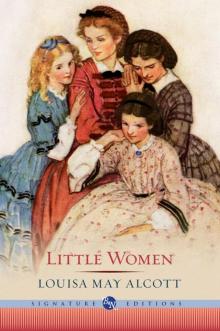 Little Women
Little Women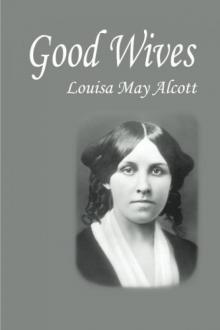 Good Wives
Good Wives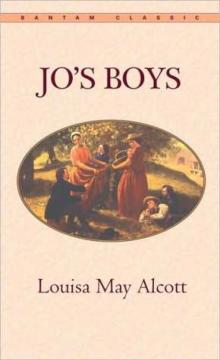 Jo's Boys
Jo's Boys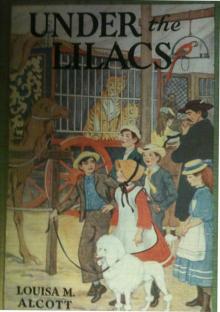 Under the Lilacs
Under the Lilacs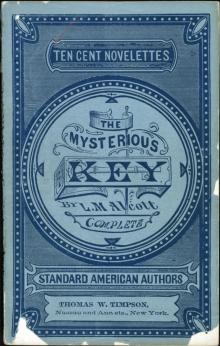 The Mysterious Key and What It Opened
The Mysterious Key and What It Opened The Inheritance
The Inheritance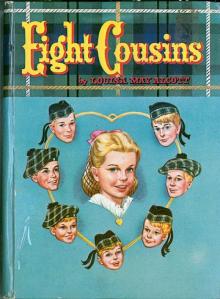 Eight Cousins
Eight Cousins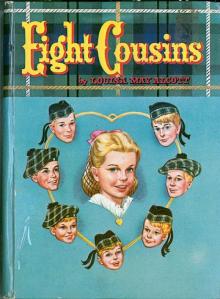 Eight Cousins; Or, The Aunt-Hill
Eight Cousins; Or, The Aunt-Hill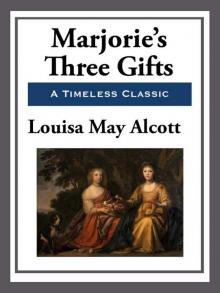 Marjorie's Three Gifts
Marjorie's Three Gifts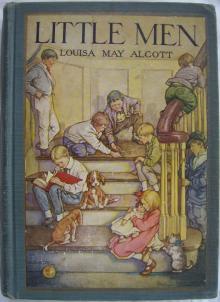 Little Men
Little Men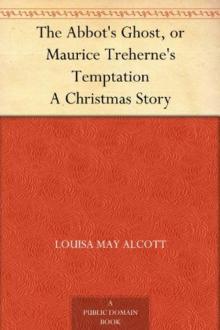 The Abbot's Ghost, or Maurice Treherne's Temptation: A Christmas Story
The Abbot's Ghost, or Maurice Treherne's Temptation: A Christmas Story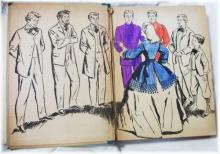 Rose in Bloom
Rose in Bloom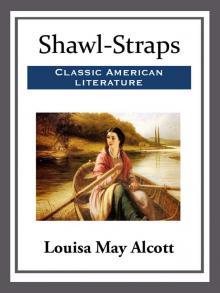 Shawl-Straps
Shawl-Straps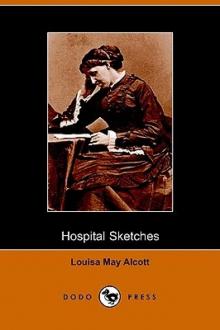 Hospital Sketches
Hospital Sketches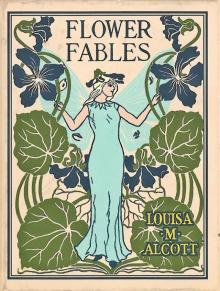 Flower Fables
Flower Fables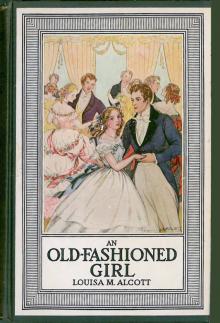 An Old-Fashioned Girl
An Old-Fashioned Girl The Candy Country
The Candy Country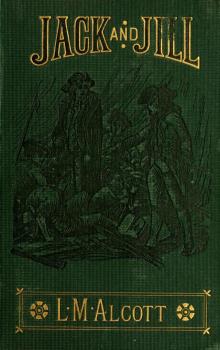 Jack and Jill
Jack and Jill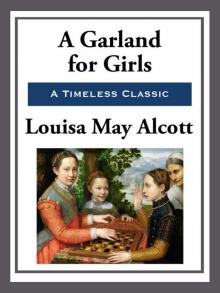 A Garland for Girls
A Garland for Girls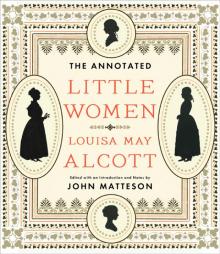 The Annotated Little Women
The Annotated Little Women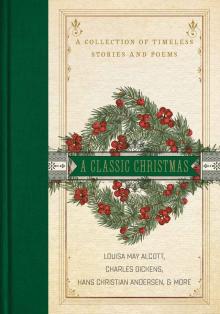 A Classic Christmas
A Classic Christmas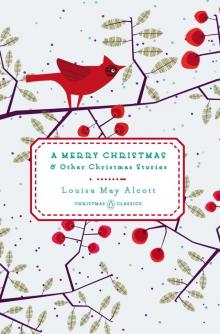 A Merry Christmas
A Merry Christmas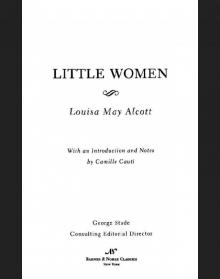 Little Women (Barnes & Noble Classics Series)
Little Women (Barnes & Noble Classics Series)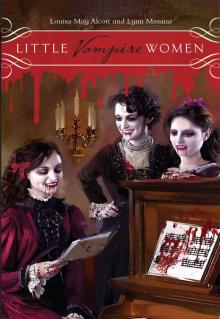 Little Vampire Women
Little Vampire Women